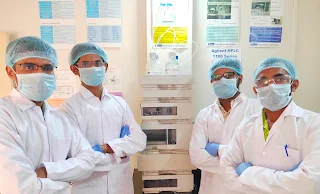The following is a summary of the main duties and roles of
the quality control division in the pharmaceutical sector:
Testing and Analysis: QC analysts subject pharmaceutical
items to a range of tests and analytical techniques. Chemical, physical, and
microbiological studies are among the procedures used to evaluate the safety,
potency, and purity of the product.
Testing of Raw Materials: To make sure that arriving
raw materials and packaging materials fulfill set standards, the QC department
inspects their quality. Ensuring the integrity of the finished product is
crucial.
In-Process Testing: To make sure the product is being
created correctly and to monitor important parameters, QC staff may carry out
in-process testing during the production process.
Finished Product Testing: One of QC's main
duties is carrying out thorough testing on pharmaceutical items that have been
completed. Evaluating the product's identity, strength, purity, and general
quality falls under this category.
Testing for Stability: Drugs must remain stable
throughout time. Stability studies are carried out by the QC department to
ascertain how the product's quality varies under different storage
circumstances.
Documentation: All testing operations are
carefully documented by QC staff. The suitability of documents is crucial to
regulatory compliance.
Validation and Calibration: To provide accurate and dependable
findings, the QC department makes sure that testing tools and equipment are
correctly calibrated and validated.
Regulatory Compliance: Quality Control (QC) is essential
to guaranteeing that pharmaceutical goods meet a range of regulatory criteria,
including Good Manufacturing Practices (GMP) and Good Laboratory Practices
(GLP).
Out-of-Specification Investigations: The QC department opens an investigation to find the source of a product's noncompliance and to provide corrective measures if necessary.
Training and Continuous Improvement: To keep
current on the newest testing methods, laws, and industry best practices, QC
staff members should have regular training. Continual process and procedure
improvement is another important duty.
Environmental Monitoring: To guarantee the sterility
and cleanliness of crucial locations, the QC department often monitors the
environment in pharmaceutical production facilities.
Conclusion
Maintaining the safety and quality of pharmaceutical products
is mostly the responsibility of the quality control department. It collaborates
with many divisions, including Production, Quality Assurance, and Research and
Development (R&D), to guarantee that pharmaceutical goods fulfill the
strictest legal and quality criteria. Preserving public health and public
confidence in the pharmaceutical sector depends on the precision,
dependability, and uniformity of quality control testing.
For more information:
Visit our website: https://www.assura.net.in/core-website/admin/register/
Join us on Facebook: https://www.facebook.com/AssuraPharmaTraining
Join us on Instagram: https://www.instagram.com/assurafoundation/
Join us on Youtube: https://www.youtube.com/channel/UC4F5b_iAkwQ1ZrN3GjMLY5A
To Buy Notes: https://www.assura.net.in/buy-notes/
Call or Whatsapp on 9175914123 / 7972910842



